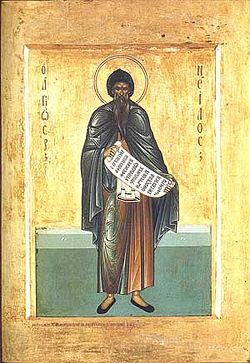Nilus of Sinai
| Saint Nilus of Sinai | |
|---|---|
 |
|
| Died | November 12, 430 AD |
| Venerated in | Eastern Orthodox Church, Roman Catholic Church, Armenian Church |
| Feast | 12 November (Catholic and Eastern Orthodox calendars) |
Saint Nilus the Elder, of Sinai (also known as Neilos, Nilus of Sinai, Nilus of Ancyra; died November 12, 430), was one of the many disciples and stalwart defenders of St. John Chrysostom.
We know him first as a layman, married, with two sons. At this time he was an officer at the Court of Constantinople, and is said to have been one of the Praetorian Prefects, who, according to Diocletian and Constantine's arrangement, were the chief functionaries and heads of all other governors for the four main divisions of the empire. Their authority, however, had already begun to decline by the end of the 4th century.
While St. John Chrysostom was patriarch, before his first exile (398-403), he directed Nilus in the study of Scripture and in works of piety. About the year 390 or perhaps 404, Nilus left his wife and one son and took the other, Theodulos, with him to Mount Sinai to be a monk. They lived here till about the year 410 when the Saracens, invading the monastery, took Theodulos prisoner. The Saracens intended to sacrifice him to their gods, but eventually sold him as a slave, so that he came into the possession of the Bishop of Elusa in Palestine. The Bishop received Theodulos among his clergy and made him door-keeper of the church. Meanwhile, Nilus, having left his monastery to find his son, at last met him at Elusa. The bishop then ordained them both priests and allowed them to return to Sinai. The mother and the other son had also embraced the religious life in Egypt. St. Nilus was certainly alive till the year 430. It is uncertain how soon after that he died. Some writers believe him to have lived till 451. The Byzantine Menology for his feast (12 November) supposes this. On the other hand, none of his works mentions the First Council of Ephesus (431) and he seems to know only the beginning of the Nestorian troubles; so we have no evidence of his life later than about 430.
...
Wikipedia
